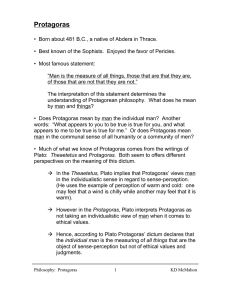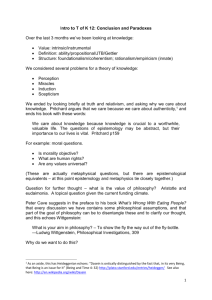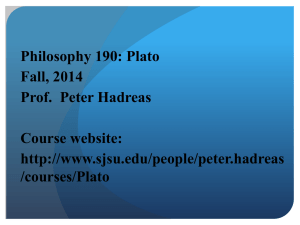AQ Philosophy Test 2 – Answers
advertisement
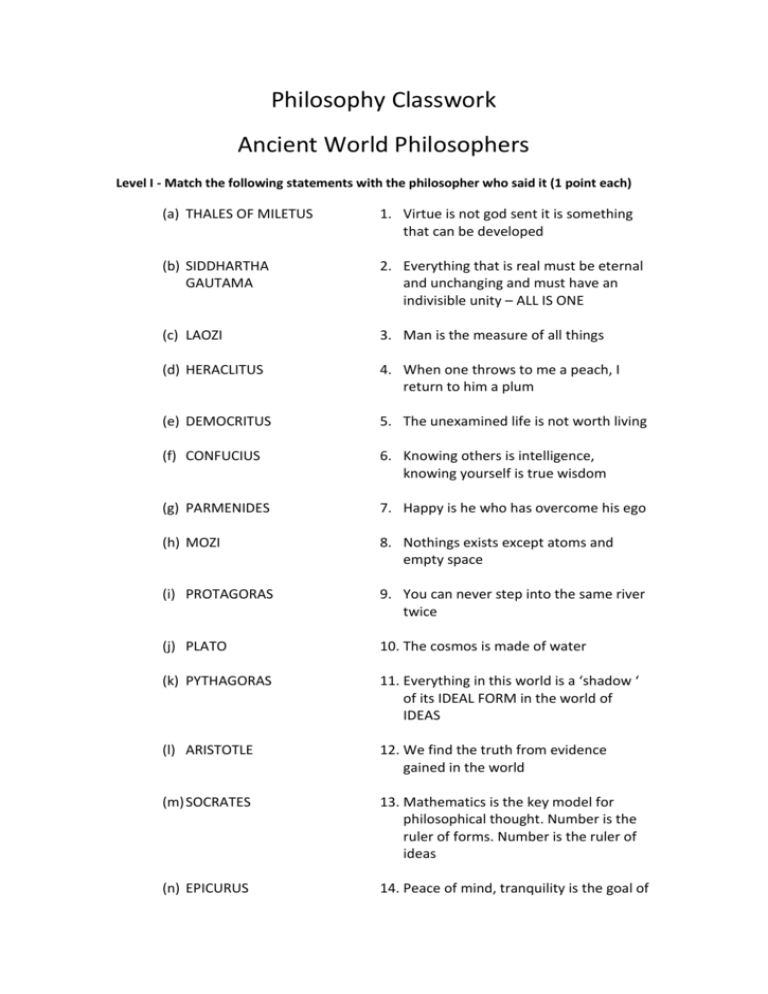
Philosophy Classwork Ancient World Philosophers Level I - Match the following statements with the philosopher who said it (1 point each) (a) THALES OF MILETUS 1. Virtue is not god sent it is something that can be developed (b) SIDDHARTHA GAUTAMA 2. Everything that is real must be eternal and unchanging and must have an indivisible unity – ALL IS ONE (c) LAOZI 3. Man is the measure of all things (d) HERACLITUS 4. When one throws to me a peach, I return to him a plum (e) DEMOCRITUS 5. The unexamined life is not worth living (f) CONFUCIUS 6. Knowing others is intelligence, knowing yourself is true wisdom (g) PARMENIDES 7. Happy is he who has overcome his ego (h) MOZI 8. Nothings exists except atoms and empty space (i) PROTAGORAS 9. You can never step into the same river twice (j) PLATO 10. The cosmos is made of water (k) PYTHAGORAS 11. Everything in this world is a ‘shadow ‘ of its IDEAL FORM in the world of IDEAS (l) ARISTOTLE 12. We find the truth from evidence gained in the world (m) SOCRATES 13. Mathematics is the key model for philosophical thought. Number is the ruler of forms. Number is the ruler of ideas (n) EPICURUS 14. Peace of mind, tranquility is the goal of (o) DIOGENES OF SYNOPY (p) ZENO OF CITIUM A10 B7 C6 D9 E8 F1 G2 H4 I3 J11 K13 L12 M5 N14 O 16 P15 life 15. Happiness is a good flow of life 16. He has the most who is most content with the least Level II - Answer the following questions with short answers. 1. What is the Socratic method?(4 points) Socrates had a way of asking questions to his fellow Athenians on their beliefs and slowly slowly with his questions showing them that they were wrong in what they proposed. Then he would proceed to tell them his perception of the truth. His method tests out possible answers to a question, rejecting any inconsistencies in logic and he slowly slowly approaches the truth 2. Explain what Plato meant by the world of Forms? (4 points) Plato believed that the world is divided into: (a) The world of beings - Transcendent beyond space and time, unchanging world, can only be perceived intellectually. This world stays the same. It is perceived in our minds. And (b) The world of becoming - In space and time, everyday world, constantly changing and you perceive it with your senses. The world of BEING is full of forms that are the causes of the particular things in the world of BECOMING. All things have essences/forms and these are located in the world of being. The world of being is full of ideas. This points to the belief in a world above space and time, a world of eternal and absolute beings, corresponding to every kind of thing that there is and causing in particular things their essential nature. 3. Complete Aristotle’s syllogism. (2 points) All men are mortal. Socrates is a man. Therefore __Socrates is mortal________ 4. What was Mozi’s philosophy and what was it aiming for? (4 points) Mozi’s philosophy was about treating others as you want them to treat you. Mozi used to say that ‘When one throws to me a peach, I return to him a plum’. He was aiming for a world in which conflict and war are avoided and this could be achieved only if everybody applied his philosophy. 5. What was the philosophy of Diogenes of Synop? What was he known for? (4 points) Diogenes’ philosophy was to live the ideal life you needed to be able to reject all forms of social custom and instead live as natural as possible. He is known for living a life of poverty in a tub. He said that ‘He has the most who is most content with the least.’ Level III – In 200 words answer the following question (10 points) What do we mean by ‘man is the measure of all things’ suggested by Protagoras? Evaluate this philosophy of life? Give 2 of its strengths and 2 of its weaknesses. Protagoras suggested that man is the measure of all things and the best example used for this statement is the one of temperature. If Ms. X says "it is hot," then the statement (unless she is lying) is true for her. Another person, Ms. Y, may simultaneously claim "it is cold." This statement could also be true for her. If Ms. X normally lives in Alaska and Ms. Y in Florida, the same temperature (e. g. 25 Celsius) may seem hot to one and cool to the other. The measure of hotness or coldness is fairly obviously the individual person. One cannot legitimately tell Ms. X she does not feel hot -- she is the only person who can accurately report her own perceptions or sensations. In this case, it is indeed impossible to contradict as Protagoras is held to have said . This philosophical approach to life has certain weaknesses. If Protagoras intends to point to a world where all is relative then his ideas are far beyond practical. If man, each man, decided their morality, their ethical code, based on what suits them then where do we draw the line of acceptable and unacceptable behaviors or lifestyles. Is it ok for the rapist to be a rapist if he considers it ok for himself? Where is the freedom of the person suffering for my exercise of my freedom? Another weakness is that this could easily lead to chaos, no stability. A society with no rules or laws but in which people act as they please, is a society that nurtures criminal behavior and insecurity for its citizens. There are not consequences for any actions, therefore ‘crime’ as one would define it is left unpunished. Children grow up to have no set of moral laws to follow, or no ethical code. The strengths of such a philosophical view are: if we take the example of the temperature, nobody is lying since it is a matter of how every person perceives things based on their prior experiences of that knowledge. In this case both people could be telling something totally valid for both and Protagoras allows for that to come to the surface. Another strength is that it puts a lot of emphasis on the freedom of the individual but also gives him a great responsibility in the exercise of that freedom. Man decides what is the right way to go therefore helps bring to surfaces ideas, behaviors, approaches that would otherwise be hidden if all were following the same route.



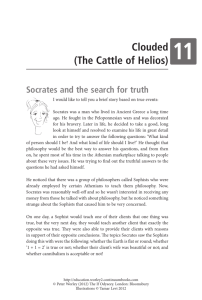
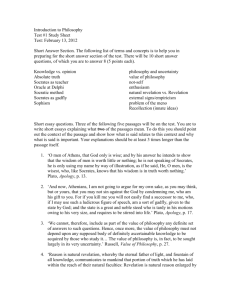



![Protagoras [No complete works by Protagoras survive. Here are some... preserved in other ancient authors.]](http://s2.studylib.net/store/data/011164317_1-8f965d02c8196183012cff6b9aad18e3-300x300.png)
